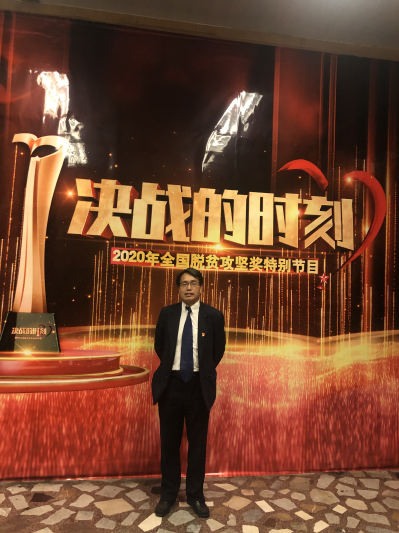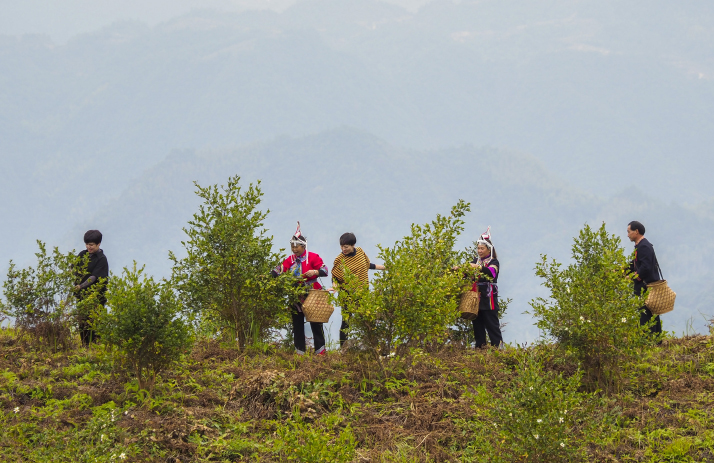|
||||||
|
||||||
| Home Nation World Business Opinion Lifestyle China Focus ChinAfrica Video Multimedia Columnists Documents Special Reports |
|
||||||
|
||||||
| Home Nation World Business Opinion Lifestyle China Focus ChinAfrica Video Multimedia Columnists Documents Special Reports |
| Nation |
| Individuals and organizations honored for their outstanding work in poverty alleviation |
| By Lu Yan · 2020-10-25 · Source: NO.44 OCTOBER 29, 2020 |
 Zhang Qi, President of the China Institute for Poverty Reduction, Beijing Normal University, receives an award for research on poverty alleviation on October 17 (COURTESY PHOTO)
Born in the 1980s, Huang Xiaoyong is an entrepreneur who used to run a foreign trade company in Shenzhen, Guangdong Province, with an annual turnover exceeding 10 million yuan ($1.5 million). Had Huang stuck to his original trajectory in life and stayed put in Shenzhen, he would have nothing to do with farming later in life.
However, in 2014, when Huang's home county Shicheng in Jiangxi Province in east China introduced a series of policies to encourage business and attract investment in a bid to facilitate poverty alleviation work, he returned home and devoted himself to developing modern ecological agriculture and teaching his fellow villagers how to make more money. "As an entrepreneur, I have the responsibility to help the poor families around me rid themselves of poverty as soon as possible," Huang told China Youth Daily. Huang received a national award on October 17 in Beijing for his outstanding work in the field of poverty alleviation. The day was also the seventh National Poverty Relief Day and the 28th International Day for the Eradication of Poverty. The national awards for outstanding work in the field of poverty alleviation, initiated by the State Council Leading Group Office of Poverty Alleviation and Development, are given annually since 2016. Individuals are awarded as role models for shaking off poverty themselves or assisting others to do so. Since 2018, organizations, too, have received accolades for their contributions to poverty alleviation. The award ceremony received more public attention this year as the deadline for the country to eradicate absolute poverty looms. "The awards encourage people in poverty-stricken areas to eradicate poverty through hard work," Wang Sangui, a member of the expert advisory committee of the State Council Leading Group Office of Poverty Alleviation and Development, told China Youth Daily.  Villagers collect the fruits of oil-tea camellia at a planting base in Lishui, Zhejiang Province, east China, on October 18 (XINHUA)
Common prosperity While running a startup business elsewhere before, Huang remained concerned about the development of his hometown, especially Aobei Village, where he was born and raised. There are over 2,000 people in Aobei. The per-capita arable land there is meager. Also, the village is located in a mountainous area, which made it difficult to increase the villagers' income and develop the village. Huang returned to his hometown and with his business experience, set up companies. Through research, he found the purple shale soil commonly seen in Aobei to be rich in nutrients such as potassium, calcium and phosphorus, and perfect for growing quality fruits. Together with his business partners, Huang in late 2014 started to cultivate large patches of barren hills and fields in order to set up a modern agricultural industry demonstration park. He had never expected his efforts to go down the drain in the following year. Shicheng suffered severe flood and large-scale landslides that swept across his new orchards. Millions of yuan vanished, while the reconstruction and restoration cost time and more money. Despite villagers voicing their doubts, Huang remained confident about the prospect of developing ecological agriculture. With the help of the local government, he obtained a national funding earmarked for water and soil conservation. By reading books and learning from experts, Huang gained knowledge about water and soil conservation and organized villagers to protect the healthy vegetation growing on the mountains and harness mountain streams for flood prevention, water storage and irrigation. The restituted flooded land was transformed into a renowned agricultural sightseeing park. In 2019, the total output value of the park exceeded 12 million yuan ($1.8 million), directly boosting the income of more than 200 people from over 130 poor households in Aobei and surrounding villages. Under Huang's supervision, several local entrepreneurs and relatively wealthy villagers in 2019 established an industrial alliance to maximize the advantages of each company and jointly deal with risks through resource sharing and real-time communication. At the beginning of this year, as the novel coronavirus disease (COVID-19) hampered the sales of a large number of agricultural products, the industrial alliance coordinated its resources and helped farmers sell their produce online. "Nowadays, my biggest wish is to forge a mature alliance, and with the policy support of the county government, everyone can live a good life through their own efforts," Huang said. At the award ceremony on October 17, 99 poverty reduction pioneers like Huang received the national honors. In addition, several organizations, including government offices, companies, a philanthropic foundation and a news media outlet also received the accolade. Green poverty alleviation While Huang has been awarded for leading his fellow townsmen out of poverty, Zhang Qi, head of the China Institute for Poverty Reduction of Beijing Normal University (BNU), received the award for research on poverty alleviation theory, policy and practice. Since the late 1980s, Zhang has devoted himself to research on rural economy and poverty alleviation policies. "I was born in the countryside, so I know what poverty does to a person. This is why I should do research on poverty alleviation," Zhang said. As China's poor people mainly live in remote rural areas, Zhang and his team mostly connect with farmers. Every year, the China Institute for Poverty Reduction sends out small teams to the poverty-stricken mountainous and rural areas of Yunnan, Guizhou, Sichuan, Gansu and other provinces to track the progress of poverty alleviation, as well as uncover the difficulties and problems in poverty alleviation. The institute constructed China's first green poverty reduction index and in 2014 for the first time released the China Green Poverty Reduction Index Report, emphasizing the connection between poverty alleviation and green, sustainable development. Zhang and his team spent three years on the index. "We want to publish reports on a regular basis to prove that green poverty reduction is the most sustainable means of poverty alleviation and strong support for rural revitalization," Zhang told China Pictorial. He said that green poverty alleviation, achieved through endeavors such as developing rural tourism and agricultural industry, have yielded remarkable results in recent years. When he joined BNU in 2003, he was the only professor there to conduct poverty reduction research. Over the years, the research team he led became bigger and bigger, and in 2011, a poverty alleviation research center was founded, which grew into the China Institute for Poverty Reduction in 2017. Now, the 30-plus experts there have carried out more than 100 research projects on poverty alleviation. Their research has attracted the attention of government departments and social organizations, illuminating policy making. (Print Edition Title: National Pioneers) Copyedited by Elsbeth van Paridon Comments to luyan@bjreview.com |
About Us | Contact Us | Advertise with Us | Subscribe
|
||
| Copyright Beijing Review All rights reserved 京ICP备08005356号 京公网安备110102005860号 |